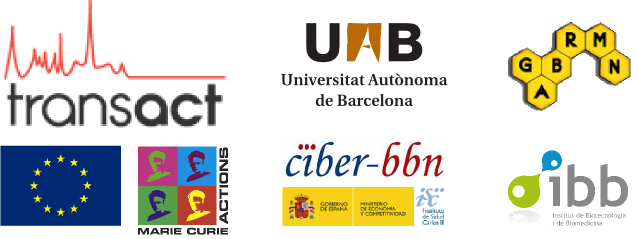 Transforming Magnetic Resonance Spectroscopy into a Clinical Tool (TRANSACT) is an European research project awarded in the call FP7-PEOPLE-2011-ITN, of the 7th Framework Programme Marie-Curie Actions, to a network of partners including the GABRMN and SeRMN at UAB, and the associated partner CIBER-BBN. The project is coordinated by Prof. Sabine Van Huffel, Prof. Uwe Himmelreich, and Dr. Diana Sima, of the Department of Electrical Engineering ESAT-SCD, and Department of Imaging & Pathology, Biomedical MRI Unit, Katholieke Universiteit Leuven, Leuven, Belgium. Scientist-in-charge at UAB will be Prof. Carles Arús (GABRMN) and Miquel Cabañas (SeRMN), and Dr. Margarida Julià-Sapé will be scientist-in-charge at CIBER-BBN. Dr. Silvia Lope-Piedrafita (SeRMN) will take part in the project as senior scientist.
Transforming Magnetic Resonance Spectroscopy into a Clinical Tool (TRANSACT) is an European research project awarded in the call FP7-PEOPLE-2011-ITN, of the 7th Framework Programme Marie-Curie Actions, to a network of partners including the GABRMN and SeRMN at UAB, and the associated partner CIBER-BBN. The project is coordinated by Prof. Sabine Van Huffel, Prof. Uwe Himmelreich, and Dr. Diana Sima, of the Department of Electrical Engineering ESAT-SCD, and Department of Imaging & Pathology, Biomedical MRI Unit, Katholieke Universiteit Leuven, Leuven, Belgium. Scientist-in-charge at UAB will be Prof. Carles Arús (GABRMN) and Miquel Cabañas (SeRMN), and Dr. Margarida Julià-Sapé will be scientist-in-charge at CIBER-BBN. Dr. Silvia Lope-Piedrafita (SeRMN) will take part in the project as senior scientist.
Starting 1st of March 2013, the TRANSACT Initial Training Network will investigate the theoretical and practical aspects of in vivo Magnetic Resonance Spectroscopy (MRS) and Spectroscopic Imaging (MRSI) with applications in oncology and neurology.
The network will host 13 Early Stage Researchers, each performing an individual research project on topics ranging from spectral quality assurance criteria to optimal exploitation of complementary multi-modal magnetic resonance imaging modalities. The research training is supervised by a consortium of 10 academic and 4 industrial partners with wide expertise in basic science, clinical research and information technology.
The specific research topics to be carried at UAB —in close collaboration with partners at the University of Bern— will be to address clinically relevant classification questions by pattern-recognition-based methods for MRS data, and to investigate the feasibility of applying such tumour-typing/grading methods to multi-voxel data and to higher fields. A new layer of meta-plugins for decision support and spectral classification will be developed based on prior experience of UAB within the INTERPRET and eTumour European projects, and they will be made available through the widely distributed jMRUI software. Finally, criteria for accuracy and outlier exploration (another aspect of quality control) will be applied to the clinical tools used for classification/discriminating purposes.
Partners: KU Leuven, Leuven (Belgium); École Polytechnique Fédérale de Lausanne, Lausanne (Switzerland); Icometrix, Leuven (Belgium); Institute of Scientific Instruments Brno, Brno (Czech Republic); The University of Manchester, Manchester (United Kingdom); Max Planck Institute for Human Cognitive and Brain Sciences, Leipzig (Germany); Radboud University Nijmegen Medical Centre, Nijmegen (Netherlands); Universitat Autònoma de Barcelona, Barcelona (Spain); University of Bern, Bern (Switzerland); Université Claude Bernard Lyon, Lyon (France); AlterSystems, Lyon (France); CIBER-BNN, Barcelona (Spain); Philips Healthcare, Best (Netherlands); Siemens Healthcare, Erlangen (Germany).
Funding Institution/Program: European Union/FP7-People Program.
Call identifier: FP7-PEOPLE-2011-ITN
Grant agreement: PITN-GA-2012-316679
Period: 1st March 2013 – February 2017
Coordinator(s): Prof. Sabine Van Huffel, Prof. Uwe Himmelreich, Dr. Diana Sima.




